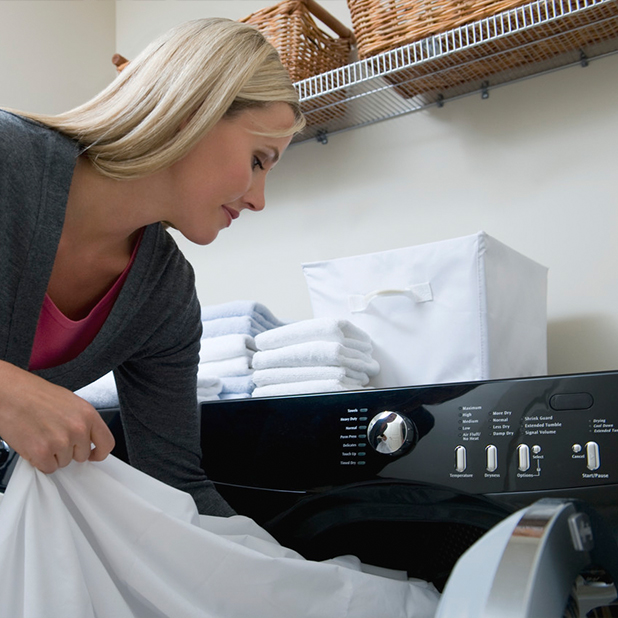Low and slow: It's not just for barbecue! Tips for getting the most out of your dryer for the least energy
July 27, 2015
 While summer is the perfect season for clothes lines and drying racks, let’s face it: when it’s time to wash your favorite bed sheets, a reliable clothes dryer is key. Clothes dryers use more energy than any other household appliance. However, you are in luck — not only do today's machines include options that dry your laundry more efficiently than ever before, they offer more customizable programs and built-in features to accommodate your family's specific laundry needs.
While summer is the perfect season for clothes lines and drying racks, let’s face it: when it’s time to wash your favorite bed sheets, a reliable clothes dryer is key. Clothes dryers use more energy than any other household appliance. However, you are in luck — not only do today's machines include options that dry your laundry more efficiently than ever before, they offer more customizable programs and built-in features to accommodate your family's specific laundry needs.
When upgrading one of your most-used appliances, there are many factors to consider.
- Dryer type: If you have an existing home, it’s probably already set up for either a gas or electric dryer. Electric dryers require a 220 volt outlet, while gas dryers require a gas connection and a 120 volt outlet for installation. With today’s gas and electricity prices, it almost always costs more to dry clothes with electricity than gas. However, 80 percent of dryers in the United States are electric. New innovations in electric dryer technology, such as heat pump dryers that recirculate hot air while removing moisture, do offer higher levels of energy savings compared to the electric models we’ve known in previous generations.
- Moisture sensors: Don’t subject your clothing to unnecessary heat! Dryers with moisture sensors help reduce energy use by automatically shutting off when clothes are dry, saving you money and reducing wear on your clothing.
- Heating: Some dryers have dual temperature heating elements, which allow them to operate more efficiently. Keep in mind that longer drying cycles on a low heat setting use less energy than shorter drying cycles on high heat. When shopping for a clothes dryer, check the Combined Energy Factor (CEF). This measures energy efficiency – the higher the CEF, the more efficient the clothes dryer.
- Increased functionality: It’s nice to have options, but too many features - like over a dozen drying cycle options - can make drying your laundry more complicated than it has to be. Depending on your family’s needs, consider the available features but be aware that they may require more energy. A clear, easy to understand control panel is also something to be mindful of when making the purchase.
- Size and location: When you’re ready to upgrade your dryer, make sure that you leave enough space on each side for heat clearance (at least one inch of space on either side for air circulation) and buy an appropriate size machine for the space. Also, most dryers give you the option of which side you want your dryer door to open on. Placing the hinge on the side opposite your washer can make it easier to transfer a damp load into the drum.
 Dryers may be late to ENERGY STAR®’s certification game, but because they use more energy than any other household appliance, dryers might just be the MVP. This past February, the U.S. Environmental Protection Agency (EPA) launched its clothes dryer certification program. You can now find ENERGY STAR certified clothes dryers nationwide at major retailers. ENERGY STAR certified dryers use 20 percent less energy than standard models without sacrificing features or performance. ENERGY STAR clothes dryers can deliver about $245 in lifetime savings. They have been rigorously tested to ensure they meet performance and energy use criteria, so you can expect top-of-the-line performance. Plus, you can put $50 back in your pocket when you purchase an ENERGY STAR certified electric clothes dryer with a rebate from Mass Save.
Dryers may be late to ENERGY STAR®’s certification game, but because they use more energy than any other household appliance, dryers might just be the MVP. This past February, the U.S. Environmental Protection Agency (EPA) launched its clothes dryer certification program. You can now find ENERGY STAR certified clothes dryers nationwide at major retailers. ENERGY STAR certified dryers use 20 percent less energy than standard models without sacrificing features or performance. ENERGY STAR clothes dryers can deliver about $245 in lifetime savings. They have been rigorously tested to ensure they meet performance and energy use criteria, so you can expect top-of-the-line performance. Plus, you can put $50 back in your pocket when you purchase an ENERGY STAR certified electric clothes dryer with a rebate from Mass Save.
Lastly, remember to always take the time to clean your washer and dryer, as this helps them run more efficiently. Lint build-up within your dryer’s exhaust vent can introduce the risk of fire, and even carbon monoxide exposure with gas dryers. Never vent your dryer indoors, and be sure to regularly check your lint trap and dryer duct. Your clothes will thank you!
Explore More Topics
Personalized Energy Saving Solutions
MyEnergy provides customized content based on your location and energy needs.
You May Also Like
The Benefits of Switching to a Heat Pump Water Heater
Upgrade to a heat pump water heater for enhanced efficiency and savings. Discover how to make the switch and improve your home's energy use.
New Year, Smart Energy Choices: Simple Steps to Make Your Home More Energy Efficient in 2026
Make 2026 the year of smart energy use. Learn easy, impactful steps Massachusetts residents can take to improve energy efficiency and save money.